Jack Fitzgerald's Blog, page 4
July 7, 2016
ENCORE: Fate Sent Me to Paris
So let’s talk a bit about how fate entered my life and sent me to Paris right into the arms of the muse.
I was an instructor of Spanish at New York State University in Plattsburg, New York. The climate in that city near the Canadian border and city of Montreal was mostly cold and during the winter—snowy, frigid and dreary. What was a person who grew up in Mississippi doing in such weather conditions? I asked myself that question practically every day I lived in Plattsburg.
In order to get away from all that winter, I worked my way into heading a group of our students studying at the University of Guadalajara in Mexico. The weather there was beautiful, warm and inviting. When the group disbanded after their semester of study, I was slated to return to my igloo in Plattsburg. I simply couldn’t My partner at the time was a young man who was a teacher of French and a lover of anything French. He suggested we go to Paris instead. At his urging, I asked for a semester’s sabbatical, which I got, and off we went to Paris for six weeks. (That was the maximum we could stay under the conditions of our cheap Icelandic Airlines tickets.) See, I had no planned rendezvous with my muse there. I was simply letting fate have her way with me via my partner’s influence.
 The six weeks flew by because we were like tourists on an extended stay. We were loving every minute of it. My partner did not want to return to the USA, mainly because he had found a job teaching English as a second language at a private language school. I felt obliged to return and had decided I would with or without him. However, a few days before my departure, I was offered a job as an English teacher. What to do? With my friend urging me to stay and my aversion to snow and dreary weather conditions, I chose to remain in Paris.
The six weeks flew by because we were like tourists on an extended stay. We were loving every minute of it. My partner did not want to return to the USA, mainly because he had found a job teaching English as a second language at a private language school. I felt obliged to return and had decided I would with or without him. However, a few days before my departure, I was offered a job as an English teacher. What to do? With my friend urging me to stay and my aversion to snow and dreary weather conditions, I chose to remain in Paris.
We had jobs that would at least cover our livelihoods but little else. Even so, what future was there for me in Paris? What could I do that would match that good post-office pension my mother had in mind? I hadn’t a clue and would just have to let fate make those decisions for me.
In the next blog, you’ll see how fate lets the muse enter my life unannounced.
(My next blog will be July 21st. See you then.)
June 23, 2016
AESOP 2016
I take turns watching CNN, FOX and MSNBC. I watch Anderson Cooper, Wolf, Gloria, Dana, Jake, Chris Matthews, Chris Hayes, Rachel Maddox, Steve, Joy, Lawrence O’Donnell, Morning Joe, Sean, Bill, Megan, Brent and tons of other pundits (mostly glam females) and dozens of analysts and moderators. Of course I don’t do this all day long. Otherwise I would lose my grip on reality.
 These politicos offer two things: (1) tea leaf readings such as Hillary is going to….., Hillary will….. Hillary believes…..; (2) Advice: Hillary should attack him back or she’ll look soft . Hillary should not attack him back because it could cause her infavorability ratings to go up. Hillary should ignore the report about her emails. Hillary should tell the American people what really happened. If I were Hillary, I would…… Hillary ought to…..Hillary would be smart if she……., Hillary’s got to be more…..
These politicos offer two things: (1) tea leaf readings such as Hillary is going to….., Hillary will….. Hillary believes…..; (2) Advice: Hillary should attack him back or she’ll look soft . Hillary should not attack him back because it could cause her infavorability ratings to go up. Hillary should ignore the report about her emails. Hillary should tell the American people what really happened. If I were Hillary, I would…… Hillary ought to…..Hillary would be smart if she……., Hillary’s got to be more…..
I swear I expect any day now to hear these pundits say that Hillary should not smile so much or that she should frown to show she is serious, or she coughed during one of her speeches and that definitely showed weakness. I would imagine in one 24 hour news cycle on one of the cable networks she is given at least 100 pieces of advice on how to be successful in her campaign.
I listen to all this drivel and each of these people I mentioned in my opening paragraph reminds me of a very bad psychic I visited once upon a time. This ersatz Gypsy had all sorts of advice for me and it turned out to be total toro poo poo. I have now come to be of the opinion that cable news shows are nothing but total toro poo poo for those who can’t think for themselves. It’s enough to drive any sane person nuts—most of all Hillary.
Today when I was listening to some runway -model type criticizing Hillary and spouting off with advice for her, I couldn’t help but think of Aesop’s 5th century BC fable about THE MAN, THE BOY AND THE DONKEY. It certainly fits the media at the moment.
Therefore, I have furnished below Aesop’s Fable for you to read and see if you don’t agree that it sounds like the present-day media’s bevy of advice motor mouths. It’s not news you know. It’s entertainment passing under the disguise of news. Just as with that bad psychic I went to, I’m wondering where all these people dig up their TPP. Is there a TPP school somewhere to prepare you to be a cable news motor mouth?(Trump University, perhaps?) So here is Aesop in the fifth century BC showing us that “know it alls” have been around for a very, very long time.
THE MAN, THE BOY AND THE DONKEY
 A Man and his Son were once going with their Donkey to market. As they were walking along by the side of the Donkey, a countryman passed them and said: “You fools, what is a Donkey for but to ride upon?”
A Man and his Son were once going with their Donkey to market. As they were walking along by the side of the Donkey, a countryman passed them and said: “You fools, what is a Donkey for but to ride upon?”
So the Man put the Boy on the Donkey and they went on their way. But soon they passed a group of men, one of whom said: “See that lazy youngster. He lets his father walk while he rides.”
So the Man ordered his Boy to get off, and got on himself. But they hadn’t gone very far when they passed two women, one of whom said to the other: “Shame on that lazy lout to let his poor little son trudge along.”
Well, the Man didn’t know what to do, but at last he took his Boy up before him on the Donkey. By this time they had come to the town. Passers-by began to jeer and point at them. The Man stopped and asked what they were scoffing at. The men said: “Aren’t you ashamed of yourself for overloading that poor donkey of yours with you and your hulking son?”
The Man and Boy got off and tried to think what to do. They thought and thought till at last they cut down a pole. They tied the donkey’s feet to it, and raised the pole and the donkey to their shoulders. They went along amid the laughter of all who met them till they came to Market Bridge. The Donkey, getting one of its feet loose, kicked out and caused the Boy to drop his end of the pole. In the struggle the Donkey fell over the bridge, and his fore-feet being tied together he was drowned.
“That will teach you,” said an old man who had followed them:
“PLEASE ALL AND YOU WILL PLEASE NONE.
So enough of the Hillary fortune telling and advice.
More in two weeks. Best to you, Jack.
June 9, 2016
Pygmalion 2016
The British playwright George Bernard Shaw wrote a biting comedy in 1913 with the title Pygmalion. In 1956, the work was adapted into a very successful Broadway musical and subsequently an Oscar winning film named MY FAIR LADY. The plot of the play and musical centered around turning a bedraggled Cockney flower girl, Eliza Doolittle, into a person who could pass for a duchess.
I believe we are entering the present day version of this plot by the turning of playboy , TV personality and billionaire Donald Trump into President of The United States of America and leader of the free world. In Pygmalion and My Fair Lady, Henry Higgins, a speech professor, is the person to whom this make-over job falls. In this year’s version. Of Pygmalion, The task of changing a bouffant hair dude playboy businessman into the leader of the Free World is assumed by the USA MEDIA.
In he last six months, the MEDIA, consisting mainly of CNN, MSNBC and FOX, thanks to all the free publicity they have given Trump, this transformation is well on its way. Mr. T’s is already the Republican’s nominee for president . This is the modern Pygmalion miracle we are witnessing and many are applauding.
Professor Higgins had Eliza to repeat such silly sayings like “The rain in Spain falls mainly in the plains.” She did this over and over until she began losing her low-class accent. This attention he showered on Eliza was pro bono, or for free. He was just trying to win a bet that he could turn her into something she wasn’t. Higgins believed that if you repeated something long enough, it would soon sound right.
The MEDIA let Trump take over for free at least 40 minutes of every hour of their cable news shows for the last six months. They let Trump and his surrogates say any inane thing they wanted and repeat it as many times as they liked until it became the truth to the listeners. Rarely did any pundit question him or his surrogates on the truth of what they were saying. They didn’t dare. Some fact checking organizations claimed that up to 87 per cent of what Trump said was only partially true or totally untrue. The name “Donald Trump” got mentioned at least 500 times a day on the media outlets. Trump believed what Lenin once said, “Tell a lie often enough and it soon becomes the truth.” Via the MEDIA’s generosity, Trump became so successful that before long he was heard to say, “I cold kill somebody in Times Square and it would only make my ratings go up.”
 Professor Higgins bullied Eliza but in this year’s Pygmalion, Donald has turned everything topsy-turvy. Via the art of bullying, he has truly turned his atomic-cloud hairdo into acceptability with all the rough-necks in The United States. He has even made the Republican Party eat crow and be hornswoggled by his bullying techniques. Most of his fellow party members appease him and don’t stand up to him just to keep from rocking the good ship Titanic.
Professor Higgins bullied Eliza but in this year’s Pygmalion, Donald has turned everything topsy-turvy. Via the art of bullying, he has truly turned his atomic-cloud hairdo into acceptability with all the rough-necks in The United States. He has even made the Republican Party eat crow and be hornswoggled by his bullying techniques. Most of his fellow party members appease him and don’t stand up to him just to keep from rocking the good ship Titanic.
Eliza wasn’t really alone in her new disguise. Professor Higgins’ sidekick Colonel Pickering, Freddy Eynsford-Hill, and the servants and housekeeper of Henry’s household felt sorry for her. They were her surrogates.
In the present day version of My Fair Donald , Trump has surrogates coming on the different media shows to brag on him. These mouth pieces can say any outrageous or scurrilous thing they want and NEVER be challenged by any news pundit. AND the media never ask them to back up their statements. The media are just totally fascinated with “Doolittle” Donald. Now that it is sure to them that he will be president, they are smug and justly proud of having. created and encouraged such a Pygmalion.
Eliza went to the Embassy ball and fooled everybody into thinking she was a duchess, even professional linguist experts.
In Pigstrompian 2016, “The Donald”goes to The Republican Convention in Cleveland and is treated like a crowned prince by one and all in his party. The MEDIA smile on the whole scene due to their having created this particular moment in American History. Donald speaks to the attendees and they scream their adoration of him. He has truly fooled each and every one of them, just as Eliza did at The Embassy Ball in Pygmalion 1913.
After the Embassy Ball, Eliza is unsure of how her life will be in the future. She has become a fabulous fake but has no experience or talent for being anything but a flower girl.
Prince Donald, after being nominated and cheered, faces the possibility of being President of The United States of American and Leader of The Free World. He has no idea of what to do next. He has been extremely clever in fooling everybody and now it’s time to pay the Piper, so to speak. So, here we have Peter Pan, the guy who never grew up, trying to run all the adults in the world. His total narcissism keeps him from being scared even though world leaders, statesmen and global politicians are mightily afraid. Those who have given their minds to this braggadocios playboy laugh and clap at his vulgarities as though they were witnessing some sort of special intelligence that only the truly biased can appreciate.
As for THE MEDIA who created this entire spectacle, they will be wallowing in money for passing entertainment off as news and popsicle minds as intelligence. They have certainly accomplished those quests in authoring “My Fair Donald.”
Pygmalion 1913 was a biting comedy on class warfare in Britain. Pogmalion 2016 is a biting horror story on present class warfare here in The USA. The heterosexual, religious, white male really has a grudge against Blacks, Latinos, GLBTs and, yes, even women who think they’re equal to them. Their problem for the last few years is that they couldn’t openly express their disdain for these people. All of a sudden, they have a spokesperson in Donald Trump, who thinks nothing of lambasting any of these people. The “take back America” crowd eats it up.
With THE MEDIA’s help, we may just set on the world stage a new phenomenon—American Fascism. You can close this show before it opens—but it’s truly up to you. When we don’t think and we let the media or a bully do our thinking for us, then we are putting ourselves and our neighbors in peril.
May 26, 2016
Busy
Let’s face it. Most people are busy. The only ones I know who aren’t busy are generally older people for whom life’s Merry Go Round has slowed way down. Their main activity at this period of their lives is being a BUSY BODY, gathering gossip and misinformation.
Take the person who has lived their productive years as a parent and/or worker performing some repetitive job for thirty or so years . One day you wake up to the fact that the kids are grown and gone, the job has now been swapped for retirement, and perhaps you have lost your spouse. You then enter the wicked world of the un-busy because you now have too much time on your hands. This is where the trouble begins. You sit around gossiping in one of God’s waiting rooms until you cash in your chips.
Most younger couples these days are overworked not just by the job that brings them in a paycheck but with supervising dancing lessons for their kids, scout activities, paint ball wars, soccer, and over a hundred other activities off springs dump on their parents.
People join clubs of all kinds. (Book clubs, a model rain club, a wine club, a garden club , a Bible study group, a writing workshop and I suppose a sex club. Apparently there are as many different types of clubs these days as hairs on your head. You have every possible outlet for getting together to chat and swap information with others. In your own way, you have to try to replicate the camaraderie you once had at your frat or sorority.
Add meal preparation to your schedule. Either you eat out or you have to dream up something for at least two meals every day to a generally unappreciative audience. You have to go shopping . If this is for clothing, it is thought of as the ultimate pleasurable use of time. If it’s grocery shopping, it’s only a few steps above the drudgery of doing laundry.
 Then you have errands to run. Take the car in for servicing or to get it repaired. A doctor’s appointment, trips to the pharmacy, going to the bank, writing out checks to pay your bills, PTA type school activities, Girl Scout cookie sales——all are guaranteed to eat up your time and make you dream of some peace and quiet. (Don’t worry. You’ll have lots of that when you retire.). All in all, life is a time challenge. You go from not having enough time to having too much time. Life become hardest when you go from “we” to “I” type living.
Then you have errands to run. Take the car in for servicing or to get it repaired. A doctor’s appointment, trips to the pharmacy, going to the bank, writing out checks to pay your bills, PTA type school activities, Girl Scout cookie sales——all are guaranteed to eat up your time and make you dream of some peace and quiet. (Don’t worry. You’ll have lots of that when you retire.). All in all, life is a time challenge. You go from not having enough time to having too much time. Life become hardest when you go from “we” to “I” type living.
I am not trying to tell you to slow down in your activities. That’s what doctors and mothers-in-laws are for. The purpose of this blog is to cheer on and encourage those of you who want to be creative and are trying to write a book or a play or screenplay while juggling it with your many other activities. It can be done but it not easy. It seems that trying to be creative in your busy years is a difficult task. Some adventurous people try to add a writing project into their sardine-can 24-hour schedule and it almost qualifies you for sainthood
Years ago when I was trying out for an acting career in Los Angeles, while at the same time trying to work and keep a roof over my head, I met an actor by the name of Jerry Chase. I was envious of him because his mother was rather famous and she could keep worldly stress at a minimum in his life via a nice allowance. Her name was Mary Chase and she was the author of the play HARVEY, which went on to become a very successful film after four years on Broadway.
I remember Jerry telling me once that he just didn’t know how his mother balanced a career as a reporter for the Rocky Mountain News in Denver with three sons and all the activities she had to maintain in her life. He said he once asked his mom how she did it. She told him it was BUSY vs. EFFECTIVENESS. She believed you should use your time as effectively as possible. One example he remembered was when she would invite him and his friends in for cookies and other treats if they’d listen to her read one of her plays to them. She was being effective in that she was keeping an eye on her kids while at the same time getting feedback on what she had written. Effectiveness, she believed, was trying to be effective in a few things instead of having too much on your plate.
She said burnout and stress were the results of trying to crowd too much into too short of a time period. Her motto was “less is better.” That was the only way she found time to write her plays. Hers was very good advice which I have striven to master over the years—to be effective with my time and do less but do it better. Then if you want to do something like writing, you will have space to create the time necessary for an “on-the-side” career.
So, take it easy in this busy world and if you’re so inclined, put a bit of creativity in your life. Then on the other hand, if you have too much time on your hands, don’t become a gossip peddler while waiting to cash in your chips. Sit down and start writing the story of your life. It’s a fun and creative way to keep you busy. Plus it’ll keep you out of trouble.
Here are some titles we have for ourselves during our productive years. Check them out and see if one applies to you.
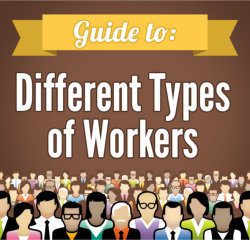 Seven Types of Workers
Seven Types of WorkersEager Beaver—an enthusiastic worker who is extremely gung ho and enjoys hard work.
Machine—this worker operates and obeys orders like a robot, has few other activities and shows very little human emotion.
Over Achiever—This worker is intense in an attempt to be successful in all tasks. In the process, this worker puts pressure on himself or herself to accomplish too much.
Peon— This describes a worker who toils very hard for very little money and feels unappreciated.
Slave — a person who is forced to work very hard for someone else and often in very bad conditions and without pay.
Workhorse — A worker who does a lot of boring and hard work.
Workaholic — People who spend the majority of their time working and who have very little interest in anything else.
Thanks for reading this blog. Please feel free to pass it along to others. The next blog will appear Thursday, June 9, 2016.
May 12, 2016
Impossible Fiction
Last night I dreamed of Mandalay—that is Mandalay, Mississippi. Such a vivid dream. The year was 1972. The president was Richard Nixon and he was running for re-election against George McGovern. Nixon had begun the Paris Peace Talks that year in an attempt to end the Vietnam War. I dreamed about my parents who lived in that little Mississippi town. In my dream, I remembered them so clearly. All seemed to be well in the country.
Last night I also dreamed of Paris, France, where I was living in 1972. I was working there as a teacher of English. I was hoping this wonderful city, which had been the home to so many famous authors, would help me become a successful writer too.
In my dream, my mind went back to a day in the teachers’ lounge at the school where I taught. A new ESL (English as a Second Language) teacher by the name of Abby cornered me with a big smile. I could tell she was hungry for talk. She quickly seated herself next to me and before even saying hello, she asked me what had brought me to Paris. I could tell that this young lady had a dozen new questions for each one I answered. I thought it didn’t make any difference what I said, she was going to run me nuts with questions.
 I told her I was a writer. She then wanted to know if I had written anything she had heard of. I said no. I was a beginning writer. She gave me a big smile as if she had it all figured out: I was a nobody and probably would remain that way. Even so, she was a serial poser of questions and I quickly decided I had to find some way to escape from her.
I told her I was a writer. She then wanted to know if I had written anything she had heard of. I said no. I was a beginning writer. She gave me a big smile as if she had it all figured out: I was a nobody and probably would remain that way. Even so, she was a serial poser of questions and I quickly decided I had to find some way to escape from her.
“What are you writing on at the moment?” she asked.
“A novel,” I replied.
“You know” she remarked with a self-satisfied smile, “you have an accent.”
She was referring to my southern accent and so defensively I retorted, “You have a definite New Jersey accent.”
She didn’t like that remark one bit so she went back to my novel. “What’s your book about?”
I am not a person who likes to discuss my personal life with strangers. She had me cornered so to speak and I felt like jumping up and running away. However, I rationalized that maybe I’d better get used to inquiring minds in case I had to pitch one of my projects to somebody like an agent one of these days. I looked at her as professionally as I could and said I was working on a novel called HAROLD’S WAY. It was set in the year 2016.
“Oh”, she remarked, “that’s futuristic science fiction.”
She was so pushy I just had to take her down a notch by saying, “No. It is social projection fiction.”
She looked at me as though I was a bit bonkers and continued,
“Like what’s your plot?”
I waited a long moment as though I were thinking. I cleared my throat and began speaking:
“HAROLD’S WAY is set 44 years in the future and deals with the presidential election that year.”
“And who are the candidates?” she inquired.
I cleared my throat again and countered,
“Buzz Cornet and Loretta Busby. He’s one of the riches men in America. He own casinos and hotels and is a super business man.”
“He doesn’t sound like much fun,” Abby smiled.
“Oh, but he is,” I said. “He is also a TV star and he’s great with the one liners. He charms the pants off the public with his proclamations of what a great life we will all have once he’s president. He says we’re going to be winning so much that we’re going to get tired of so much good fortune. He brags on how much we love him. and how much he loves us.. He has an orange colored, cotton-candy hair do that could more likely be called a hair don’t. It makes him stand out though. He’s always putting people down and his groupies love that. He says he’s going to expel all eleven million illegals living in the USA. He’s also going to build a gigantic barricade along the Mexican border. It will be on the order of The Great Wall Of China and will keep out trash and terrorists from other countries—and he’s going to make Mexico pay for it. Everyone will have a job and health care will be free for all. He is taking back America from its first black president whom he is hoping to replace. He is for keeping women in their place . He’s kind of like the Klu Klux Klan’s poster boy. He’s their type of guy.”
Abby looked shock and said, “You’ve got to be kidding. He sounds like a playboy jerk pretending to be president.”
“Yep,” I replied. “”But that’s his charm. That’s why everybody has gone ape over him. He’s 2016’s Peter Pan. The guy who never grew up. People just can’t get enough of him. ”
“And you say a woman would be his opponent in this election? You’ve got to realize that sounds a little far fetched. Who could she possibly be?”
“Loretta Busby. She is a former senator from New York and was Secretary of State under the black guy.’”
“Oh, please,” said Abby. “She sounds like she ought to be his mother.”
“In a way, that’s it. He’s a spoiled teenager and she’s his strict mother,” I remarked. “She is a former teacher—an intellectual type who knows her stuff. People don’t like her because she’s so strict. See, everybody knows she is the best qualified to be president but she doesn’t seem like much fun. She is the teacher you remember from high school who wasn’t very much liked but she taught you more than the rest of your teachers put together.”
“I don’t know what you call all of this,” Abby frowned, “but I call it a horror story. In fact, I’d say it’s impossible fiction. No one would believe any of this for a second. I think you had better get another story line going. ”
With this, she quickly got up, excused herself and left the teachers’ lounge. I smiled after she was gone and really had a good laugh. I was pleased with myself that I had come up with something so weird that it would send her fleeing. She for sure thought me crazy and unstable for dreaming up such a ridiculous story. I guess I would be the master of Looney Tunes if I actually wrote such a book. At least it served its purpose of getting rid of Abby.
Then I woke up and it is 2016.
April 28, 2016
Plot
Plot is the “to be or not to be” of writing. You must have a key plot to work with when you are creating a book, screenplay, stage play or short story. In a previous blog I showed you how to use your life lessons to tell a story. These are the incidents you string around a central plot.
What is plot? Basically it is the nervous system of your writing project. In other words, plot is all action and nothing else. It’s what keeps your audience reading or watching your creative work. Plot keeps your reader or viewer involved and wanting to know what will happen next.
Sounds a bit daunting? Yes, because you are nowhere unless you have a good plot. So how do I come up with one? First of all, you must understand that the essence of a plot is when you have one person wanting something or to do something and another person or nature keeps him or her from succeeding. Your creative effort is just a series of one person trying and another person throwing tacks in their path. The end of your plot is when person A finally wins or fails.
The more conflict you have, the better your plot and the easier it will be to write. In my view, one third of all books published have plot problems. Faulty plotting is what causes writer’s block and even abandoning a project after a chapter or a few scenes. Your plot not only has to be interesting enough for you to write but for your reader to read. Interest comes mainly from conflict.
I believe your best option for coming up with a winning plot is to think up a basic conflict. Then work a lot of minor conflicts around it until your leading character wins or loses I suggest you write down a quick synopsis of your story’s major conflict. Afterwards start listing a dozen possible minor-conflicts. Remember, the more conflict you have, the more interested you and your reader or viewer will have in the project.
Many books are on the market purporting to teach you all about plots. The old standby of them all is called The Thjrty-Six Dramatic Situations. Over a hundred years ago, a Frenchman by the name of Georges Polti scoured literature for all the plots he could get his hands on, ranging from Greek works up to French and English literary efforts of his day. He then narrowed their plots down to just thirty-six major conflicts. His text is a good place to go check out the thirty-six major conflicts in literature.
 I remember once I wanted to write a play but had no idea for a plot. Via Polti, I came up with Cinderella. (Many people use fairy tales as the source of their plots.) I knew I didn’t want to call my play some clever form of Cinderella but needed to have a title that was catchy and fit in with the play in a kitschy sort of way. I knew I wanted it to be a comedy but it still had to have the basic conflict of the fairy tale. I would just modernize it in some way.
I remember once I wanted to write a play but had no idea for a plot. Via Polti, I came up with Cinderella. (Many people use fairy tales as the source of their plots.) I knew I didn’t want to call my play some clever form of Cinderella but needed to have a title that was catchy and fit in with the play in a kitschy sort of way. I knew I wanted it to be a comedy but it still had to have the basic conflict of the fairy tale. I would just modernize it in some way.
I ended up calling my play COLD DUCK after one of he cheapest bottles of booze you can get at the supermarket. Supposedly it’s a mix between red wine and champagne. It’s pretentious swill at best in my estimation.
I set the play in a modern home where a woman has a step-daughter and two daughters. Her children are rather nice looking. One works at a doughnut shop and the other as a cashier at a supermarket. The stepdaughter is not nice looking at all and has no shape but is a straight A student in college. The mother and daughters leave to go to a big Republican fund-raising party where a young, unmarried Senator will be the guest of honor.
The step-daughter is left at home to study and iron the clothing of her half-sisters. A door-to-door saleslady representing cosmetics and foundation garments drops by to sell her things. She quickly realizes the step-daughter is not a potential customer. The saleslady feels sorry for her thoiugh and fixes her up to go to the same party as her step-mother and step-sisters. . Instead of a glass slipper, the step-daughter is wearing fake hips to give her some shape. The saleslady’s son runs a limousine service. He takes her to the party but has to be back at his company by midnight. The step-daughter does meet the young, good-looking Republican senator (“ a prince of a guy.”) At midnight in leaving rapidly, the step-daughter’s phony hips fall off and that is what the Senator uses to look for his beloved. He does find her much to the chagrin of the step-mother and the two half-sisters.
The play was first produced at the Theatre de Tertre in Paris by the Paris English Theatre and was a roaring success. I have made more money off of this play than any of my others. I have cut and pasted the first page of the script. It will show you how I took the basic plot (conflict) and adapted it to my writing purposes. If you would like to read the entire play, it is part of an anthology of my plays entitle PARIS PLAYS. You can find it on amazon.com or barnesandnoble.com. Remember, the better your plot, the better your writing.
Cold Duck
Act I
The present. The interior of a middle class home. An air of total disorder prevails. The place, in effect, looks as if it had been stirred with a stick. FRANCINE, a plumpish woman in her early fifties, is seated on a couch and is talking on the telephone. She has a big mouth and laughs after each statement she makes as if to emphasize it. JOETTA, her eldest daughter, a rather pretty but strumpety looking girl, is under a hairdryer end doing her nails. VITA JEAN, her second daughter, is shaving her legs with an electric razor. VITA JEAN is a vixen of sorts and breathes lust. ERICKA, the youngest of FRANCINE’S brood, is her step-daughter. She, wears glasses and is dressed in blue jeans, a sport shirt and tennis shoes; she is ironing a dress. ERICKA is thin and shapeless and not pretty at all.
FRANCINE:
(on the telephone)
That would be just fabulous if you could swing it, Helene. I know the girls would really appreciate it . . . . Oh, they’re busy getting all dolled up. Even if I say so myself, they’re a couple of knockouts. . . . Just a minute, Helene. (cupping the mouthpiece with her hands and shouting over at the girls) Could you cut those contraptions off for a couple of minutes? I can’t hear a word Helene is saying. After all, this is more for your benefit than mine.
JOETTA:
You’d better cut it short, Mom, if you don’t want to make us late for the party. (They don’t cut off the hairdryer and the electric razor.)
FRANCINE:
(back into the telephone)
Oh, Helene! The girls are so excited I can’t do a thing with them. I’d better get with it myself. I’ll see you at the party. Oh yeah. My girls will appreciate anything you can do in the way of getting them introduced around. They’re a little bit shy, you know.……Okay, Helene. I don’t know how we’ll ever thank you for getting us the invitations.. …See you later…Bye now. (She hangs up) (to VITA JEAN and JOETTA) Helene is going to meet us at the party and introduce us around. How’s that for speedy work?
VITA JEAN:
Personally, I feel like I’m being sold by the pound.
FRANCINE:
That’s right, Miss Priss. Got any alternatives? Don’t you know it takes making the best of what you’ve got while you’ve still got it? And that takes salesmanship. In case you’re interested, it’s a buyer’s market.
JOET’TA:
(yelling at ERICA)
Ericka, for God’s sake, don’t scorch it. Use a damp rag. I can smell smoke.
ERICKA:
(stopping)
Iron it yourself then. But of course, you can’t iron.
FRANCINE:
Girls, girls:! That’ll be enough of that. Joetta, you ought to be more appreciative of Ericka’s help. And Ericka, you don’t have that many assets to rely on. Once these girls are set up, they’ll help you.
ERICKA:
I’m not holding my breath for that day.
FRANCINE:
I know you’re bent out of shape because you can’t go to the party, Ericka, but, dear, it’s just not your cup of tea.
ERICKA:
You mean I haven’t got anything to sell.
My next blog is in two weeks, May 12th. In the meantime, my very best to you. .
April 14, 2016
Life Lessons
One of the ironies of our present day educational systems is that grammar, sentence structure and logic are no longer in vogue like they once were. Speak to anyone around my age and they can name their grammar teacher from high school and more than likely describe what a tough bird she or he was. Mine was Miss Maudine Few and she was quite exacting when it came to grammar and the eight parts of speech.
The English language has eight parts of speech: noun, pronoun, verb, adjective, adverb, preposition, conjunction and interjection. Each part of speech shows the role a word plays grammatically in the sentence. ‘In grammar classes, diagramming a sentence was thought of as an intellectual necessity. Nowadays I bet most young people would not even know what you meant by diagramming a sentence. Also don’t ask them to name the 8 parts of speech. Such skills are no longer required for a student to receive a diploma.
In spite of lacking the basic preparation as mentioned in the previous paragraph, more books are being written than ever before. About 30,000 new books hit the market in the USA monthly! A good many of them are overflowing with bad grammar, weak construction and dull material.
Also something called “a blog” has been born in recent years. It’s a cross between a magazine article and an essay. The number of blogs these days run into the millions—with this blog being just one of them—and new blogs popping up daily.
We have arrived at the point where literary overkill is the order of the day. We find a lot of sizzle (hype) but very little steak (mostly sloppy prose.) Together they spell mediocrity. The solution lies in the use of better grammar, sentence structure and interesting ideas (see last week’s blog.)
If you hope to become a serious writer, you will do well to study grammar and sentence construction—either that or pay out big bucks for an editor to make all the corrections for you. Even so, you still must work on your story-telling abilities. This means that a book or a screenplay or a stage play is composed of many little scenes strung together by a common thread much like a necklace. Each scene must have a beginning (a setup), a middle (a central action) and an end (punch line type wrap up.) Don’t leave out one of the three elements and don’t overdo any one element.
You probably are asking: Where do I come up with these little scenes? Answer: They’re all around you. Just be on the lookout for them. I bet if you went to Walmart recently, you saw something unusual. There is your sketch. It could have consisted of a mother with a child who wanted her to buy cookies. You have the setup and the central action begins when the kid starts yelling. So, how did it end? Did she give in and buy the cookies or did she slap the child? She had to do something. Maybe she just totally ignored her offspring and the “little noise factory” finally shut up.
The most appealing topics are actual life lessons authors have learned on their travels through life . Scenes without all three elements make for dull reading or viewing. This is the best way to write a page-turner script or book.
Write down some questions or prompts to guide you in coming up with meaningful little incidents. In the following paragraphs, I have asked myself a question or a prompt. I have written a brief scene in response. Some of these experiences have already appeared in several of my published books.
Try answering these questions and prompts or make up ones of your own. Be sure when you respond to them, you have all three elements: setup, action and conclusion.
Describe a major disappointment in your life.
I was teaching school in the Los Angeles area and at the same time was trying to become a professional actor. I appeared in several plays at the Glendale Centre Theater. Once I had the title role in a play called” The Handyman. “ I got great reviews in the local press, One night an, older, larger-than-life type lady was in the audience. Afterwards we met and she invited me over to her home the following week. She said she wanted to talk to me about taking the play to Broadway with me as the star. Her name was Lottie Horner and she was quite renown in New York. I was on my way, I thought. Here comes the big time. A few days later before we were to sign the contracts at her lawyer’s office, I read in Variety that she had died of a heart attack. This caused me to have to struggle ten more years before I finally got my toe through the show business door.
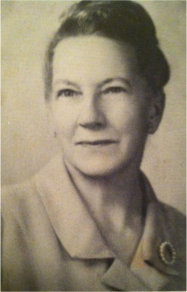
Sally Kelley was my father’s first cousin.
When you were a kid, who could you always go to for honest answers?
Sally Kelley was my father’s first cousin. She was a writer and poet, taught piano, her husband Harry played for the Chicago Cubs and she was the mother of two boys. She never sugar-coated things. I found out early on that she was straight forward. I remember once when I was in the ninth grade, she came for a visit. I was writing a short story and asked her to read it. I wanted to know what she thought. She laughed and said it was not good at all. She then told me that I should continue writing and write all the time. That was the only way to get better. Up until she passed away, I could ask her anything and knew I was going to get an honest answer.
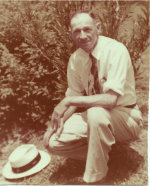
My father, Everette Fitzgerald.
Write a funny story about your father to show his sense of humor or lack of it.
I lived with my great-aunt in Jackson, Mississippi, when I was in the sixth grade. My father worked for the railroad. He had a pass and would pop in to visit us from time to time. I bought a white rabbit the Easter I lived in Jackson.. My aunt decided she did not want me to keep it in her house. My father took it home with him. On the train gong back, a guy sitting in his row of seats asked what he did for a living. My father replied that he was a magician. The guy said he would like to see a trick. My father asked him if he would like to see him pull a rabbit out of his hat. The guy was dubious but shook his head yes. My father worked the rabbit out of the cage into his hat and proceeded to show it to the man and others. He made believers out of them. My father loved human comedy like this and was always pulling tricks of one kind or another.
Describe the first car you ever owned.
It was a 1926 Four-door, Hudson Essex Super Six that I bought my senior year in high school. It cost my father $75 dollars. My friend and I would drive it all over town as though we were big shots. Unfortunately it threw a piston through the block and died one very beautiful Sunday afternoon. I recently saw where a restored 1926 Essex was selling for $52,000.
Describe the house you lived in while growing up.

The house in Mississippi where I grew up in 1912.
It was built in 1854. During the Civil War, it was used as a hospital. In the latter part of the 1800s it was a fashionable girls school. Then it passed into the hands of my great-aunt Mattie and subsequently to my father. As a child I slept upstairs in a hallway. Some nights I thought I heard waltz music playing in the far distance. Some people told me it was the wind blowing through the eaves. Others told me the house was haunted. Presently the house is on the city registry of historical homes, In a tourist brochure it states that the current owner claims on certain quiet nights, she can hear waltz music playing in the far distance.
Check over your experiences in life and use them to advantage in sprucing up your w4riting.
March 31, 2016
Ideas
Yes, where does a writer’s fancy have its inspiration? Just think back over any book or film you’ve seen. If you’re like me, you kind of wonder where writers get ideas for their projects? You also wonder about the people who populate their work? Where do they come from?
I can’t speak for all writers, but I can speak for myself. One of the questions that seems to always get asked of me at book signings is “Where did you get the idea for this book?” Many times I’d like to reply, “At Walmart.”
It’s not that simple though. Ideas are like microbes swimming around in your brain waiting to reproduce themselves. To come to any fruition, three parts of that microbe have to be present. In other words, an idea has three parts: people, places, things. The three parts are vastly different.
People
You have two choices. You either invent them from scratch or you use someone you know in real life or have possibly seen at Walmart. I’d say that in most of my writing, I make up about a third of my people and the other two-thirds are folks with whom I have somehow shared a moment or two in life. You, of course, have more control over those individuals you create.
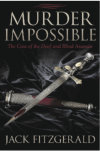 You can cook up any blend of their likes, dislikes and physicality. With real people, the die is cast. You are pretty much limited to an already set of looks and likes. I have more fun with those that I make up. In my last book MURDER IMPOSSIBLE, if you’ve read it, try and figure out which characters were based on real people and which were totally invented. I’ll give you a little head start in your thinking. Two people who were made up were the bon vivant spinster Vicky and the deaf and dumb murderer Brian.
You can cook up any blend of their likes, dislikes and physicality. With real people, the die is cast. You are pretty much limited to an already set of looks and likes. I have more fun with those that I make up. In my last book MURDER IMPOSSIBLE, if you’ve read it, try and figure out which characters were based on real people and which were totally invented. I’ll give you a little head start in your thinking. Two people who were made up were the bon vivant spinster Vicky and the deaf and dumb murderer Brian.
Two characters I based on people I personally knew were Olivia and Ron, our two amateur sleuths who are the main characters of the book. You have your choice. One set of characters comes with restraints while the others are free to be dealt with as you like.
Places
This idea category is sometimes called “background” or “setting.” All paintings have background and a setting. The same can be said of your writing. All the stages you have your characters cavorting upon have one thing in common. They must be exciting and interesting. If you have uninteresting people playing out their roles against a dull background, you’re going to know rejection intimately.
Now here is the scoop about “places.” For the most part, they should be real ones that you have experienced. That way your writing will take on a three-dimensional flavor. Your reader, listener or viewer must be able to almost smell the place. So it behooves you to get out of your digs and check out the world in which you live.
Sometimes, however, you will have to use a background which you do not know. Here is where you must do extra-careful research. You cannot have a background that’s like a painted backdrop on a stage. It will look and feel phony from the get go.

PT Barnum Museum
Obviously you will not paint yourself in a corner except rarely. I had to do it once when writing my book CONTESSA. The leading character and a friend took a weekend trip to the P. T. Barnum museum in Bridgeport, Connecticut. I had no way out because I had never been there. What was I to do? I got maps and read as much as I could about the place. I then wrote with an image in my head. It worked I think because I didn’t get any flack from the city once the book was published.
Consider these other examples: Margaret Mitchell writing in GONE WITH THE WIND about the siege of Atlanta as if she were in the middle of it; Mary Renault writing about daily life in ancient Greece in THE PERSIAN BOY.
Background is very important so if you haven’t lived it, then you must make yourself research to the point where your imagination will suffice. In the book I am now writing MURDER AMONG THE ANCIENTS, I am telling the story of Cleopatra’s sister who comes to Ancient Ephesus and is murdered.
In this book I go from ancient to modern times where Olivia and Ron (our amateur sleuths from TEDDY BEAR MURDERS and MURDER IMPOSSIBLE) finally solve the murder after two thousand years. I can tell you the amount of research I’ve done on Ancient Ephesus is enormous. So, “place” can be either real or a figment of your imagination. Either way it has to live for the reader. If you are writing a contemporary work, you are in luck because you can choose any setting that is around you. This cuts down on the amount of research involved and makes for re-living your life in a certain place and time.
Things
This refers to the things that happen in our lives. This category has three parts: real, almost real and contrived. You can have all of them or a combination of the three.

Ephesus
The murders in my book TEDDY BEAR MURDERS were based totally on real homicides that were committed by a former student of mine. I changed very little in the plot points. I just merely fine tuned them. For my present book, MURDER AMONG THE ANCIENTS, I was listening to our guide in Ephesus and as we passed a set o f ruins, he said, “This is the temple where Cleopatra’s sister was murdered.” I quickly asked him a few questions and knew that here was a “thing” I could write about when I got back home.
For “things” and “places,” you can just look and listen a lot wherever you find yourself. You’ll discover more than enough plots to fill all your future works. Plot is happening all around you at any given minute. Just be aware of it and you’re on your way.
There you have it. Where do my ideas come from? Mainly as you can tell, they are all around me at any given time. I just have to mix them together like a salad and let life do the rest.
Best to you and keep a sharp lookout of the world in which you’re passing through.
March 17, 2016
Speaking & Writing for Success
The first year I began writing this blog, I authored two articles concerning The Fog Index. In them I described what The Fog Index was and how to use it effectively to your advantage.
The Fog Index (in case you weren’t with us in those early days of this blog or you don’t remember) is a way of measuring the intellectual level of what you have to say. Yes, a formula does exist for doing this. As I pointed out in those two earlier blogs, the normal level for successful communication is at the7th to 8th grade level. Even many college texts are only written at the 10th or 11th grade level. Very, very little contact between people these days is written or spoken at the 12th grade or college level.
Most sit coms on TV are written at the 5th or 6th grade level and most contact between people takes place at about the 6th or 7th grade level at best.
My goodness but after my two blogs appeared a year or so ago, I found I had opened a can of worms. Quite a few jaded comments came my way. People simply would not believe me. They thought they were quite in the right by composing cold and formal letters, books, articles and screenplays. They thought themselves brainy even though their writing output received very little profit or notice.
Most people acted as though I had made all of this up and that I was trying to put them down. I can assure you both are not true. I am merely the servant carrying the unwanted message. You can Google “Fog Index” and find all the facts about skillful communication.
Before you Google, let me basically refresh your memory. The core of the Fog Index depends on two things: how many three-or-more syllable words you use and the length of your sentences. From these two items, you can find out the level of your writing or speaking. (You should attempt to use very few three or more syllable words and the length of your sentence should only rarely exceed 16 words.)
 The Gunning Fog Index Readability Formula, or simply called THE FOG INDEX, was devised by an American textbook publisher, Robert Gunning. He observed that most high school graduates were not able to read. Much of this reading crisis was due to how something was written.. His belief was that newspapers and business texts were full of “fog” and hard words.
The Gunning Fog Index Readability Formula, or simply called THE FOG INDEX, was devised by an American textbook publisher, Robert Gunning. He observed that most high school graduates were not able to read. Much of this reading crisis was due to how something was written.. His belief was that newspapers and business texts were full of “fog” and hard words.
How to judge the level of your writing:
Take a sample of 100 words or so of your writing.
Count the number of sentences.
Divide the number of words by the number of sentences to get the average sentence length.
Count the number of three or more syllable words (i.e. Fog words.) Do not count names of people or places or hyphenated words or words that become three syllable by the addition of –es, –ed or -ing.
Divide the number of Fog words by the number of words in your passage, which will give you the percentage of Fog words.
Add the average sentence length and the percentage of Fog words.
Multiply the result by 0.4.
The result is the grade level of your passage.
For the best writing or speaking, the Fog Index (grade level) should be grade 7 or 8. Anything at level 11 or above would be thought of as difficult for most people to read or understand or easily process.
The Bible, Shakespeare. Mark Twain, Entertainment Weekly and People magazine have a sixth grade level Fog Index. Time Magazine, The Atlantic Magazine, The Wall Street Journal and Newsweek have about an 11th grade Fog Index.
Most of my blogs as well as this one are written at the 7th grade level, which means they are fairly easy to read. Popular books are written at the 7th or 8th grade level. Most movies are written at the 6th to 8th grade level. Otherwise, people would drop off to sleep while watching them. Certain youth market films, sit coms and TV ads are written at the 6th grade level—and sit-coms many times will even instruct you when to laugh.
 The Fog Index is an outgrowth of the work of Edward Bernays, who was an Austrian-American pioneer in the fields of public relations, propaganda, hype and the human herd instinct. One of his protégés was Dale Carnegie, the author of “How To Win Friends and Influence People.” Joseph Goebbels, Propaganda Minister for Nazi Germany, stated that he used Bernays’ book “Crystallizing Public Opinion” as his basis for controlling the thinking of the German population.
The Fog Index is an outgrowth of the work of Edward Bernays, who was an Austrian-American pioneer in the fields of public relations, propaganda, hype and the human herd instinct. One of his protégés was Dale Carnegie, the author of “How To Win Friends and Influence People.” Joseph Goebbels, Propaganda Minister for Nazi Germany, stated that he used Bernays’ book “Crystallizing Public Opinion” as his basis for controlling the thinking of the German population.
Bernays combined the ideas of his uncle, Sigmund Freud, Frenchman Gustave Le Bon and Brit Wilfred Trotter to come up with ways to control a crowd’s behavior. He felt such manipulation was not only possible but necessary in society. He therefore became the father of what is known today as Public Relations or how to manage the human herd instinct and group mind of a set of people.
Bernays during his lifetime helped industrialists sell their goods, helped politicians get elected and even helped change public opinion on political matters both nationally and internationally. One of his greatest accomplishments was in convincing the American public that it was okay for The United Fruit Company in tandem with the U. S. Government to overthrow the ruler of Guatemala to gain control of their banana market. It was he who coined the phrase “Banana Republic.” This brings us to the national election of 2016 in which we are presently embedded. Of all the people running for the office of president, only two seems to know of Bernays’ ideas and are practicing them.
 The first person is Donald Trump. So many people at the moment are puzzled as to why he is so well-liked. It’s simple. He is in total charge of our “herd instinct” as crafted by Bernays. His Fog Index when speaking is never above grade 7. His sentences are short and he rarely uses three or more syllable words. Thus, even the totally uneducated (which he says he loves) can clearly understand him and thus enjoy him. He is at the moment the king of the human heard instinct.
The first person is Donald Trump. So many people at the moment are puzzled as to why he is so well-liked. It’s simple. He is in total charge of our “herd instinct” as crafted by Bernays. His Fog Index when speaking is never above grade 7. His sentences are short and he rarely uses three or more syllable words. Thus, even the totally uneducated (which he says he loves) can clearly understand him and thus enjoy him. He is at the moment the king of the human heard instinct.
 The second is Hillary Clinton, She uses Bernays’ methods a lot but not to the extent Trump does. The reason she generally comes off better in debates and town halls is because she practices many of Bernays’ beliefs about expressing yourself. She generally speaks at a grade 8 to 9 level by making sure her sentences are not too long and watching her use of three-or-more syllable words.
The second is Hillary Clinton, She uses Bernays’ methods a lot but not to the extent Trump does. The reason she generally comes off better in debates and town halls is because she practices many of Bernays’ beliefs about expressing yourself. She generally speaks at a grade 8 to 9 level by making sure her sentences are not too long and watching her use of three-or-more syllable words.
Bernie Sanders apparently hasn’t heard of Bernays. He generally stays at about grade level 10 or 11. This means he is in danger of putting people to sleep or causing his listeners’ minds to wander. He has managed to gather large crowds but that is mainly due to a curiosity of his being a Socialist, playing Santa Claus and running Spring Break type meetings.
Cruz, Rubio and Kasich are at grade 9 to 11 and portray very little of Bernays. Most of their sentences are too long and peppered with too many three-syllable words. They definitely are not as easily understood as Trump or Hillary.
So, if you want more success in your writing or oral skills, you’d do well to make sure you are easily understood. To do that, you must conquer the Fog Index and follow as many of Bernays’ practices as possible.
March 3, 2016
Films vs. Movies
During the Oscar season my mind always seems to go back to the Golden Age of Hollywood, which to me occurred from 1939 to 1951. This would be my most favorite time frame when “movies” might rightly be called “films.” The difference being the later are classics in my way of thinking while the former are merely entertainment for the masses on the order of material made specifically for television. In other words, I think films turned into movies once television got a foothold on the American entertainment psyche during the 1950s.
The eleven-year stretch of “films” I mentioned above also had classic actors, actresses, directors and writers. These are the people I think of whenever I hear the word “Hollywood.” In their films, these creative artists were young and in their prime and thought of as gods and goddesses. Their creations from the Golden Era will continue to be seen as long as Turner Classic Films remains in existence or film courses are taught at universities.
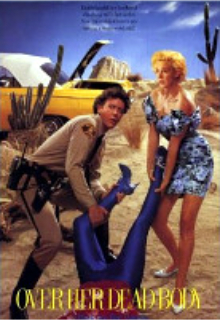
One of Jack’s movies “OVER HER DEAD BODY.”
TCM recently had a series called “31 days of Oscar” and a documentary entitled “And The Winner Is.” Many of the pictures they included in these specials contained a lot of the films from the eleven–year period. The players in these films are like old friends and as new generations of film viewers arrive on the scene, these classical productions continue to shine. We must realize that it was not only actors and actresses who shone so brilliantly during this time but also gifted directors and writers. Simply put, we had a wonderful mixture of creativity which has not been seen or rarely equaled since.
I know some people do not like reading lists but I think as a memorial to those eleven years which I have labeled “The Golden Age of Films,” it would be fitting that I at least point out a who’s who of that particular time. Just think of how many times you have seen these names or how much they are constantly being mentioned in film folklore. The interesting thing is to many young people who were not even born when these films came out, these people and films are quite familiar. So here we go with these timeless films and their creative population.
Some of the films of this Golden Age were Dark Victory, Gone With the Wind, The Wizard of Oz, Stagecoach, Grapes of Wrath, Rebecca, Citizen Kane, Here Comes Mr. Jordan, How Green Was My Valley, The Maltese Falcon, Sergeant York, Mrs. Miniver, Casablanca, Laura, Mildred Pierce, The Best Years of Our Lives, It’s A Wonderful Life, Gentleman’s Agreement, Johnny Belinda, The Treasure of Sierra Madre, A Letter to Three Wives, The Heiress, All About Eve, Sunset Boulevard, A Streetcar Named Desire, Pride and Prejudice.
Some of the Stars were Clark Gable, Vivian Leigh, James Stewart, Bette Davis, Greer Garson, Irene Dunn, Henry Fonda, Joan Fontaine, Olivia de Havilland, Katharine Hepburn, Ginger Rodgers, Fred Astaire, Judy Garland, Gary Cooper, Cary Grant, Mae West, Orson Wells, Barbara Stanwyck, James Cagney, Rosalind Russell, Edward G. Robinson, Humphrey Bogart, Ingrid Bergman, Claudette Colbert, Gregory Peck, Joan Crawford, Ronald Colman, John Wayne, Loretta Young, Joseph Cotton, Joel McCrae, Frances Dee, Ruby Keeler, Audrey Hepburn, Hattie McDaniel, Butterfly McQueen, Deborah Kerr, Spencer Tracey, Gloria Swanson.
Some of the directors were Frank Capra, John Ford, William Wyler, George Cukor, Alfred Hitchcock, Howard Hawks, Michael Curtiz, Mervyn LeRoy, Sam Wood, Henry King, George Stevens, Henry King, Cecil B. DeMille, Leo Mc Carey, Otto Preminger, Billy Wilder, Clarence Brown, David Lean, Elia Kazan, John Houston, Fred Zinneman, Joseph L. Mankiewicz, William Wellman, Carol Reed.
A few of the writers were Sidney Howard, Preston Sturges, Donald Ogden Stewart, Herman J, Mickiewicz, Michael Kanin, Ring lardner, Jr., James Hilton, Norman Krasna, Julius and Philip Epstein,, Howard Koch, Lamar Trotti, Billy Wilder, Robert E. Sherwood, Sydney Sheldon, Charles Brackett.
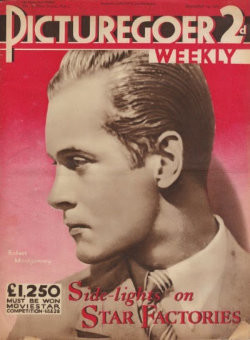 All of the above people created the films which you see over and over and are shown all the time on TV. Theirs was a lasting vision which they are still sharing with you and me. These films still manages to give us much joy and entertainment no matter how many times we see them.
All of the above people created the films which you see over and over and are shown all the time on TV. Theirs was a lasting vision which they are still sharing with you and me. These films still manages to give us much joy and entertainment no matter how many times we see them.
The only problem is that all of these people are now dead except for Olivia de Havilland , who is 99 years old and will be 100 this July 1. Over the years people my age watched the film stars from the Golden Age as they “matured” into middle age and then old age and then we read their obituaries. We occasionally saw some of them on talk shows when they were quite elderly and their magic had long since deserted them. We actually wished we hadn’t seen them because we really would like to remember them as they were in the Golden Era— stalwart, strong and projecting their certain enchantment. Through the magic of film though, they still live on. You can see them most nights. Just turn on your TV and relive the Golden Age of Film with them.



